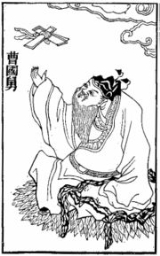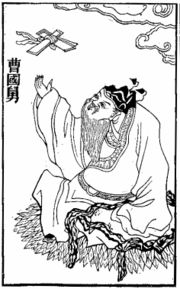
Royal Uncle Cao
Encyclopedia

Eight Immortals
The Eight Immortals are a group of legendary xian in Chinese mythology. Each Immortal's power can be transferred to a power tool that can give life or destroy evil. Together, these eight tools are called "Covert Eight Immortals" . Most of them are said to have been born in the Tang Dynasty or...
, Royal Uncle Cao or Cao Guojiu (曹國舅 in pinyin
Pinyin
Pinyin is the official system to transcribe Chinese characters into the Roman alphabet in China, Malaysia, Singapore and Taiwan. It is also often used to teach Mandarin Chinese and spell Chinese names in foreign publications and used as an input method to enter Chinese characters into...
: cáo guó jiù or in Wade-Giles
Wade-Giles
Wade–Giles , sometimes abbreviated Wade, is a romanization system for the Mandarin Chinese language. It developed from a system produced by Thomas Wade during the mid-19th century , and was given completed form with Herbert Giles' Chinese–English dictionary of 1892.Wade–Giles was the most...
: Ts'ao Kuo-ch'iu) is named one of the following:
- Cao Yi (曹佾 cáo yì) (courtesy name Gongbo (公伯 gōng bó))
- Cao Jing (曹景 cáo jǐng)
- Cao Jingxiu (曹景休 cáo jǐng xiū)
- Cao You (曹友 cáo yǒu).
He was said to be the uncle of the Emperor
Emperor of China
The Emperor of China refers to any sovereign of Imperial China reigning between the founding of Qin Dynasty of China, united by the King of Qin in 221 BCE, and the fall of Yuan Shikai's Empire of China in 1916. When referred to as the Son of Heaven , a title that predates the Qin unification, the...
of the Song Empire, being the younger brother of Empress Dowager Cao (曹太后 cáo tàihòu).
In historic records, there were several Emperor-consorts Caos in the Song Empire, but only one became empress: Cishengguangxian Empress (慈聖光獻皇后 cí shèng guāng xiàn huáng hoù) (1015 - 1079), the wife of the fourth Song emperor, Rénzōng (仁宗), none of whose children became an emperor.
However, this therefore does not render the historical existence of the "Royal Uncle Cao" impossible as in pre-modern China, the address "uncle" also meant "brother-in-law". Sometimes specified as "Wife-uncle" (妻舅 qī jiù) or as a respect, "Little Uncle" (舅子 jiù zǐ). Císhèngguāngxiàn Empress did have a younger brother named Cao Yi in historical record. But the given name of Royal Uncle Cao being Yi as well could be a post hoc.
Cao Guojiu's younger brother Cao Jingzhi (曹景植 cáo jǐng zhí) was a bully, but no one dared to prosecute him because of his powerful connections, not even after he killed a person. Royal Uncle Cao was so overwhelmed by sadness and shame on his brother that he resigned his office and left home.
Depiction
He is shown in the official's court dress with a jade tablet. Sometimes he holds castanetCastanet
Castanets are a percussion instrument , used in Moorish, Ottoman, ancient Roman, Italian, Spanish, Sephardic Music, and Portuguese music. The instrument consists of a pair of concave shells joined on one edge by a string. They are held in the hand and used to produce clicks for rhythmic accents or...
s.
His jade
Jade
Jade is an ornamental stone.The term jade is applied to two different metamorphic rocks that are made up of different silicate minerals:...
tablet can purify the environment.
Royal Uncle Cao is considered the patron deity of actors
Acting
Acting is the work of an actor or actress, which is a person in theatre, television, film, or any other storytelling medium who tells the story by portraying a character and, usually, speaking or singing the written text or play....
.

